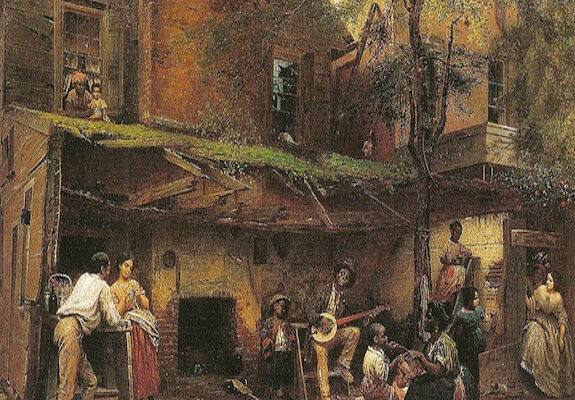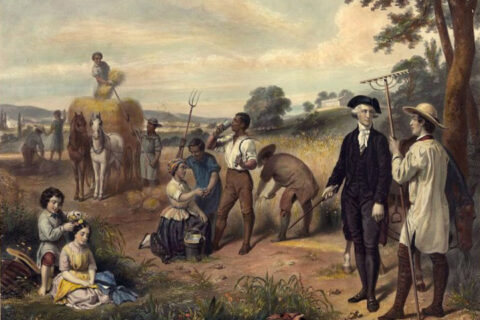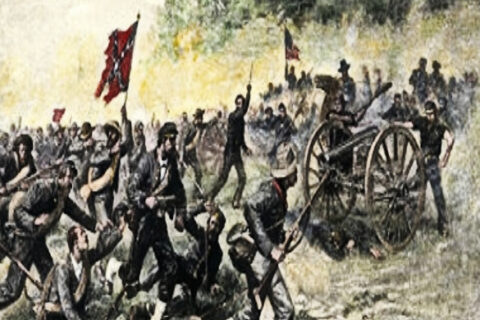This is not meant in any way to justify slavery in the South. Few could be more for liberty and against any form of slavery than me. As a Christian libertarian-minded individual, slavery in all forms, wage labor, indoctrination, ownership of human property, etc., to me, are all proof of a fallen world. Even defenders of slavery, such as James Hammond of South Carolina, admitted slavery was not desired. He said no one in heaven is a slave, and any perfect paradise one could imagine would not include slavery. Slavery, Hammond believed, was a result of a fallen world, and only God could abolish it.
What I aim to do is to take the lawyer’s role of defending the South while searching for a more historically accurate depiction of slavery, in this way we can learn the truth about slavery while still condemning it. What follows will not give an entirely fair account of slavery in the South. It is meant only to tell the side of slavery that is not given to the public. For example, a source I will often use is Born in Slavery: Slave Narratives from the Federal Writers’ Project. This collection is made available online by the Library of Congress. It contains thousands of interviews with former slaves and is an excellent first-hand account of slavery from the perspective of slaves themselves. In this collection, and others like it, which I will also use from time to time, you will find some of the most horrific accounts of torture, rape, beatings, mistreatment, neglect, and murder involved with the slave system in the South. These evils did occur. But you will not see me quote any of these examples for two reasons.
The first is because the typical understanding of slavery we are given in schools, newspapers, books, magazines, and documentaries already includes these undoubted facts. So, there would be no gain from repeating or reinforcing that perception. Secondly, I am here taking the role of a lawyer defending a client, so I seek to only present data that puts my client in a better light. This is not lying or an attempt at being misleading, but it is, in our case, telling more of the truth, the parts that are regularly omitted or overlooked.
We all have learned of the worst evils of slavery in the South; this is not the whole picture, and in some ways is misleading. The Northern Republicans demonized the South and slaveowners to help convince the Northern population they were justified in eradicating the agrarian South. If you want to take others’ wealth on a large scale and mold them to your own image, it helps first to degrade those you steal from to justify your actions. This is what the North has accomplished.
So, I assume we all have had this portrayal of slavery given us. This chapter is meant to provide the rest of the picture to provide a fuller, more historically accurate understanding of the slave system to the reader.
James Kennedy points out that we should also keep in mind that the evils of slavery are common to humanity as a whole. Terrible sins that occurred during slavery can happen whenever one sinful human being has power over another, as the totalitarian governments of the past century displayed. As a Christian, I believe the family unit is a good thing, yet it can also be abused. A father murders a son; a wife kills her husband or child; domestic violence, rape, etc. all occur. But that does not make the family unit wrong, only wrong in the way it was used; it misused its intention. It is the same with police; their job and purpose are good, but there will always be abuse in a fallen world with fallen men.
Again, I am not saying that slavery was an ideal institution, like the family or should be promoted as families are. What I am saying is that looking at only the worst examples and then claiming the whole system was like that is deceitful. It might help demonize a particular section or people who differ from us, but it will obscure rather than reveal the full truth. The latter is what I hope to do here.
Slavery, as we are commonly expected to imagine it, was not the condition of the majority of slaves in the American South. In her book A Grandmother’s Recollections of Dixie, Southerner Mary Bryan said of slavery, “No subject has ever been so misrepresented as has this one.” Our modern view of slavery started with the political works of abolitionists before the Civil War and later post-World War 2, when all the survivors of slavery were deceased. While it is true that horrible things happened during slavery, Southern writers would maintain that these were more the exception, than the rule.
A historical understanding of slavery can show us how loving relationships were formed even in adverse conditions. Black and white share a common history that does not need to cause division today. Nothing is used more in modern politics than slavery to divide and conquer “we the people,” to set us up against each other. I hope to unite us, rather than further divide us.
Further, we should not forget the North maintained slavery in various states throughout the War, and many Southern slave owners were native to the North or still lived in the North. In 1860, in Social Relations in our Southern States, Southern slaveowner Daniel Hundley blamed the vast majority of the evils committed against slaves on former Yankees who had bought plantations in the South over the past 50 years. These owners did not inherit slaves but got in the “business,” caring only for money. In Plantation Life Before Emancipation, Southerner R.Q. Mallard wrote, “while there were many honorable exceptions, as a general rule, the Northerners made the severest masters; and the explanation given was that they had not grown up with and formed attachments to the negro.” In his Ottawa speech in 1858, Abraham Lincoln seemed to agree when he said, “Some Northern [men] go South, and become most cruel slave-masters.” Northerner Joseph Ingraham visited the South and agreed when he said of the planters of Mississippi:
“Many of the planters are Northerners… they become thorough, driving planters… Their treatment of their slaves is also far more rigid. Northerners are entirely unaccustomed to their habits, which are perfectly understood and appreciated by Southerners, who have been familiar with Africans from childhood… Inexperience leads him [the Northern planter] to hold the reins of government over his novel subjects with an unsparing severity, which the native ruler of these domestic colonies finds wholly unnecessary. The slave always prefers a Southern master, because he knows that he will be understood by him. His kindly feelings toward, and sympathies with slaves, as such, are as honourable to his heart as gratifying to the subjects of them. He treats with suitable allowance those peculiarities of their race, which the unpractised Northerner will construe into idleness, obstinacy, laziness, revenge, or hatred. There is another cause for their difference of treatment to their slaves. The Southerner, habituated to their presence, never fears them, and laughs at the idea. It is the reverse with the Northerner: he fears them, and hopes to intimidate them by severity.”
Joseph Ingraham, The South-West by a Yankee

Jeb Smith is the author of four books, the most recent being Missing Monarchy: Correcting Misconceptions About The Middle Ages, Medieval Kingship, Democracy, And Liberty. Before that, he published The Road Goes Ever On and On: A New Perspective on J. R. R. Tolkien and Middle-earth and also authored Defending Dixie’s Land: What Every American Should Know About The South And The Civil War, written under the name Isaac C. Bishop. Smith has authored dozens of articles in various publications, including History is Now Magazine, The Postil Magazine, Medieval History, Medieval Magazine, and Fellowship & Fairydust and featured on various podcasts including The Lepanto Institute.






I think the best, most comprehensive book on slavery in the Antebellum South is “Roll, Jordan, Roll” by Eugene Genovese. It’s a great read and won the Bancroft prize for its painstaking detail on all aspects of the world the slaves experienced. As you have said, slavery in the South certainly sucked if you were a slave, but there was frankly no better place to be a slave than in the South. If you were in the Middle East, you were castrated if male and made a harem sex slave if female (and disposed of when your youthful looks faded). In South America and the Caribbean, the weather was more humid and hot, and your master was across the Atlantic ocean, meaning you couldn’t complain to him if you had a cruel overseer. It gets worse if you were in the Caribbean, as since you were on an island you couldn’t even run away.
Ancient warriors might ramsom noble captives but spare common captives and take them as slaves which was better than death as they had no POW camps at the time or prisoner exchanges
In time, wars were fought to take slaves as manual labor was worth a lot back then.
After slave revolts the Romans began integrating slaves into the peasant class, free but under heavy restrictions as was Jim Crowe which might have proved the answer had not the Civil War intervened and Reconstruction, during which Yankees rigged the vote against the White Yeoman majority to prevent Jim Crowe, of all things.
The KKK was orginally about the franchise, only later during the Eugenics Era about race although the two were of course always involved i.e. the Freedman vote was not any better informed at the time and prdominantly for Republican-Negro candidates as they are for Democrats today.
Lincoln, Grant and Johnson saw the majority White Yeomanry as key to Reconstruction as they’d been harmed by the slave system as well as the slaves.
Notable Southern Whigs like Wade Hapton, Longstreet and other “Fusionists” also understood this but the Depressionof 1873 stymied progress along industrial lines as well as Carpet Baggers and Scalawags.
Slavery persisted in the Colonies due to labor shortages which persisted through the close of the frontier and into today’s immigration crisis which has always been a political issue-economic issue of propety and labor rather than any moral issue IMO.
After all, Free Men can treat each other pretty bad too.
I would personally never “condemn” slavery, particularly antebellum slavery, but that’s just me. Our Lord never condemned the institution that I’m aware of, so I’m not especially persuaded by arguments claiming its condemnation is somehow Christian, or, “what Jesus would do.”
I too enjoy reading the narratives you mention from time to time; I would just caution that first-hand testimonials and eye-witness accounts are notoriously flawed, regardless of what is being recounted or by whom. This is why people are too often falsely accused and falsely convicted in the so called courts of justice. (Side note: my kids will quickly tell you that, when they were growing up and would occasionally get into an unresovable dispute between themselves, and one of them would bring it to me to settle, I would simply inform the child in question that, since I was not a witness to the events (s)he was describing, and since I already knew there would be *at least* as many versions of her story as there were kids involved, that I would therefore have no reliable way of determining whose story was most accurate, or whose story was least accurate. And that, therefore, to get me involved would be a huge mistake on her part – “best better work it out between yourselves.” See, people don’t necessarily lie when they tell their stories, but they do necessarily tell it from their own perspectives; they’re telling “their truth,” as the cool kids nowadays say.
You’re right to point out that Northern masters were especially hard on their blacks compared to Southern masters – there’s a great body of evidence still extant to support that claim. Dr, Dabney has a lot to say about that, and so does Eliza Frances Andrews, to name a couple of contemporary Southern writers off the top of my head (see Dabney’s letters to General Howard, chief of the Freedman’s Bureau, as well as Miss Andrews’s “Civil War” memoirs in these connections).
I like your position basically stating that, ‘that a human institution is flawed doesn’t necessarily mean it should be overthrown therefore.’ That’s classic Dabney in the first place, and it simply makes all kinds of sense to those of us who tend to think with our heads, rather than with our emotions, second.
I look forward to reading the next part.
But even if something is not condemned, it does not make it right or “good.” There were no slaves in the Garden of Eden nor in heaven. The Bible does not say gambling is a sin but it does call it foolish. Ideally there would be no slavery of any form.
But the scriptures say that we’re slaves (and friends because of Him) of Christ. Being slaves to His will is not “grievous”, but simply our “reasonable service” for His redemption of us. His “yoke is easy and His burden is light.”
I recommend Thornwell’s ‘The Church and Slavery’.
https://www.biblicalandsouthernstudies.com/product/13/THE-CHURCH-SLAVERY
The bible expressly sanctions permanent, domestic slave holding as a lawful institution for the people of God, in the very book where they were set apart to holiness:
Lev 25:44 As for your male and female slaves whom you may have: you may buy male and female slaves from among the nations that are around you. 45 You may also buy from among the strangers who sojourn with you and their clans that are with you, who have been born in your land, and they may be your property. 46 You may bequeath them to your sons after you to inherit as a possession forever. You may make slaves of them, but over your brothers the people of Israel you shall not rule, one over another ruthlessly.
God declared it to be lawful. It is unbiblical to declare it to be an evil.
I think that you are imposing current norms into the past when things were quite a bit different.
Military flogging persisted through this period as well as conscription for instance.
Federal troops who turned their guns on Southern Reconstruction militias turned them on plains Indians after 1876 and coal miners in Pennsylvania and West Virginia.
We have never looked at societal classes like Europeans but they do exist if not formally codified.
That’s one of the few things Stowe got right: Simon Legree, the sadistic villain in Uncle Tom’s Cabin, wasn’t a Southerner but a Yankee transplant.
Another excellent article Jeb. I eagerly await the next part.
Thank you! This should have MANY parts to it, we will see what they do with the material, how they break it up.
Slavery was the largest in Brazil with populations from Western Africa. It was also the Last largest country to end it by force from Great Britain and The United States.
Always stay proud Dixie!
Its time to stop apologizing for Southern slavery. No other modern example of the institution cohered as closely to biblical standards and no other institution known to man could have accommodated 400,000 benighted, miserable Africans and elevated their status in 4 generations while their population grew 10 fold and provided them with a life expectancy similar to European whites and a living standard comparable or superior to any agricultural peasantry in the world at the time.
To have been a slave on a Southern plantation in the 19th century was the equivalent of winning the lifetime lottery jackpot for an African.
Dr. James Henley Thornwell, one of the greatest pastors and theologians of the 19th century, declared Southern slavery a “positive good”. He was correct.
“Moses legalized domestic slavery for God’s chosen people, in the very act of setting them aside to holiness. Christ, the great Reformer, lived and moved amidst it, teaching, healing, applauding slaveholders; and while He assailed every abuse, uttered no word against this lawful relation. His apostles admit slaveholders to the church, exacting no repentance nor renunciation. They leave, by inspiration, general precepts for the manner in which the duties of the relation are to be maintained. They command Christian slaves to obey and honor Christian masters. They remand the runaway to his injured owner, and recognize his property in his labor as a right which they had no power to infringe. If slavery is in itself a sinful thing, then the Bible is a sinful book.” – R L Dabney, Life of Lt Gen Thomas J Jackson
“Was it nothing that they [the Africans] should be brought, by the relation of servitude, under the consciences and Christian zeal of a Christian people, in circumstances which most powerfully enlisted their sense of responsibility, and gave free scope to their labour of love?
Let the blessed results answer, of a nation of four millions lifted, in four generations, out of idolatrous debasement, “sitting clothed, and in their right mind;” of more than half a million adult communicants in Christian churches! And all this glorious work has been done exclusively by Southern masters; for never did foreign or Yankee abolitionists find leisure from the more congenial work of slandering the white, to teach or bless the black man in any practical way.
“This much-abused system has thus accomplished for the Africans, amidst universal opposition and obloquy, more than all the rest of the Christian world together has accomplished for the rest of the heathen.”
— Rev Dr. R. L. Dabney